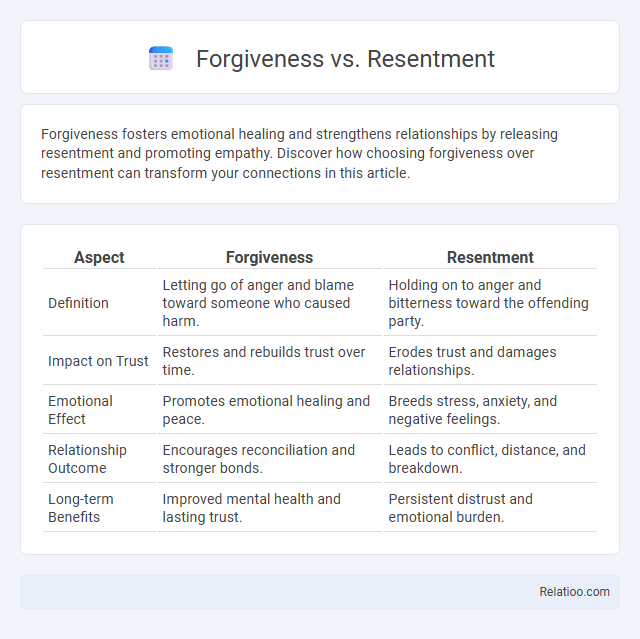Forgiveness fosters emotional healing and strengthens relationships by releasing resentment and promoting empathy. Discover how choosing forgiveness over resentment can transform your connections in this article.
Table of Comparison
| Aspect | Forgiveness | Resentment |
|---|---|---|
| Definition | Letting go of anger and blame toward someone who caused harm. | Holding on to anger and bitterness toward the offending party. |
| Impact on Trust | Restores and rebuilds trust over time. | Erodes trust and damages relationships. |
| Emotional Effect | Promotes emotional healing and peace. | Breeds stress, anxiety, and negative feelings. |
| Relationship Outcome | Encourages reconciliation and stronger bonds. | Leads to conflict, distance, and breakdown. |
| Long-term Benefits | Improved mental health and lasting trust. | Persistent distrust and emotional burden. |
Understanding Forgiveness: Definition and Importance
Forgiveness involves consciously releasing feelings of anger or resentment toward someone who has caused harm, promoting emotional healing and mental well-being. Understanding forgiveness is crucial in overcoming the pain caused by infidelity, as it allows you to rebuild trust and restore relationships. Prioritizing forgiveness fosters inner peace and prevents the destructive cycle of bitterness from undermining your emotional health.
The Nature of Resentment: Roots and Consequences
Resentment often originates from perceived betrayals or injustices, with infidelity serving as a common trigger that deeply wounds trust and emotional security. This persistent emotional bitterness can erode relationships and hinder the healing process, making forgiveness a challenging yet crucial step for restoration. Understanding the psychological roots of resentment enables individuals to address unresolved pain and promote emotional resilience.
Psychological Benefits of Forgiveness
Forgiveness reduces stress and anxiety by promoting emotional healing and restoring inner peace, which can counteract the psychological damage caused by resentment and infidelity. Embracing forgiveness helps you rebuild trust and fosters resilience, enabling healthier relationships and improved mental well-being. Choosing forgiveness over resentment breaks the cycle of pain, encouraging personal growth and long-term emotional stability.
Emotional Toll of Holding Resentment
Holding resentment after infidelity significantly intensifies emotional distress, leading to chronic stress, anxiety, and depression. This emotional toll impairs trust rebuilding and prolongs relationship recovery by fostering bitterness and ongoing conflict. Forgiveness, by contrast, promotes healing and emotional relief, though it requires time and genuine effort to overcome deep-seated resentment.
Forgiveness vs Resentment: Key Differences
Forgiveness involves consciously letting go of anger and resentment towards someone who has caused harm, promoting emotional healing and improved mental well-being. In contrast, resentment fosters ongoing bitterness and negative emotions, which can damage relationships and increase stress levels. Choosing forgiveness over resentment supports healthier interpersonal dynamics and personal growth.
Steps to Cultivating Forgiveness
Cultivating forgiveness after infidelity involves acknowledging your pain, understanding the impact on your emotions, and choosing to release resentment for your own healing. You can start by communicating openly with your partner to rebuild trust and setting healthy boundaries to protect your emotional well-being. Regular self-reflection and seeking professional support enhance your journey toward forgiveness and reconciliation.
Overcoming Barriers to Letting Go of Resentment
Overcoming barriers to letting go of resentment after infidelity involves recognizing and addressing the deep emotional wounds that fuel anger and mistrust. Forgiveness requires your willingness to release these negative emotions, rebuild trust, and foster healing within the relationship. Embracing this process helps transform resentment into understanding, promoting emotional resilience and relational growth.
Forgiveness in Relationships and Personal Growth
Forgiveness in relationships fosters emotional healing and strengthens trust, enabling partners to overcome hurt caused by resentment or infidelity. Embracing forgiveness promotes personal growth by encouraging empathy, reducing stress, and building resilience against future conflicts. Research in psychology highlights that forgiveness enhances overall well-being and deepens emotional connection within intimate partnerships.
The Role of Empathy in Forgiving and Healing
Empathy plays a crucial role in forgiving and healing after infidelity by allowing you to understand your partner's emotions and the complexities behind their actions, which reduces resentment and fosters emotional connection. This deep emotional insight helps shift focus from blame to compassion, creating a foundation for rebuilding trust and moving past the betrayal. Embracing empathy facilitates the release of negative feelings, promoting healing and stronger relationship resilience.
Moving Forward: Choosing Forgiveness Over Resentment
Choosing forgiveness over resentment empowers your emotional healing and fosters a healthier path forward after infidelity. Holding onto resentment often prolongs pain and inhibits personal growth, while forgiveness releases negative energy and opens the door to rebuilding trust and self-worth. Embracing forgiveness allows you to reclaim control over your emotions and create a future grounded in resilience and hope.

Infographic: Forgiveness vs Resentment
 relatioo.com
relatioo.com